
NCAA Football Legends: The 10 Greatest College Footballers of All Time?
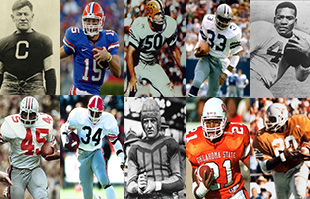
For many young college players who take the field in every game, the challenge before them must be overcome. It might be difficult for a player to inhibit the desire to play football for one of the greatest franchises in America, considering that this drive and ambition is what keeps them motivated. The bright lights, adulation, glory, and potential Super Bowl rings are the sparks that keeps many young players’ fires burning.
For others, concentrating on the future, especially a career in the NFL, is a fool’s game. The path to glory is paved with fool’s gold and not everyone who was a standout in college football could exhibit the same dominance in pro football. For many players, they don’t even make it that far. Football is a tough business and only the strong survive. The strongest, however, become greats. Only the exceptional make it to legendary status.
When all is said and done, however, the mark of a true competitive footballer is not looking past the task at hand. That means performing consistently for your college, wearing your jersey with honor, and maintaining the traditional values that your college stands for. Players at colleges with rich histories, such as Nebraska, Notre Dame, or USC, understand that they are representing something that truly means something.
Then there are the maverick types. The mercurial and exceptionally gifted footballers who love nothing more than to play the game and get down to business. For these guys, the win is all that matters. Not even the allure of playing for their hometown franchise is enough to wash the unbridled fun and raw excitement from their veins.
College football is loved, in part, for this collection of characters and magicians. College football is part of America’s DNA and the legends that have graced it will always be remembered for their heroism and triumphs.
What Makes an NCAA Football Legend?
Are legends born, or are they made? To many observers of college football, the answer will probably be both. After all, there are some things you can’t teach and there are other things you can’t learn. When it comes to football – a team game that is considered one of the most ferocious on the planet – there are many key attributes needed to succeed. Of course, what will stand out first and foremost, are individual skills.
College football is viewed around the world with a certain awe. This is n’t a professional sport, with professional-level finances, yet games are played in stadiums that would put many pro soccer or rugby teams to shame. The level of interest in NCAA football is huge and the spectacle is truly remarkable. What many observers outside North America have difficulty understanding is that this is, essentially, amateur sports.
With that level of passion and love, the great athletes in the history of college football have been provided with an environment where they can thrive. They are cheered on by tens of thousands on a consistent basis, championed in the media for their successes, and appreciated for everything that they do on the field. College football is the envy of the world, and the players, if they don’t already know it, should.
Of course, NCAA football may be on top of the world when it comes to non-professional football, but things weren’t always that way. In fact, when many of the true legends of college football were cutting their collective teeth, the entire scene looked completely different. This proves that there is more to a legend than what they have around them. It comes down to what is inside their heart, soul, mind, and body.
Skills and Qualities of a Legend
If you have ever tried to compare two exemplary actors, musicians, artists or even cars, you will know that they do not always resemble each other. In fact, it is the innovation and groundbreaking efforts that make something stand out as an example of a legend. Therefore, attempting to find parallels between NCAA football legends isn’t often an easy thing to do. It is usually the individual qualities that make a player great.
In football, where star athletes are specialists in their positions, things are even more difficult to do. For example, you cannot compare the greatness of NFL star Reggie White, a defensive lineman, with the exemplary brilliance of Tom Brady, a quarterback. The skills and attributes required to be a great defensive lineman and an exemplary quarterback are so far apart. However, there are other qualities that are not.
A legend may have stood out in a certain position and have achieved greater than anyone ever had before them in that position. They may have made more sacks than any other player in a Super Bowl, or simply made more passing touchdowns. Aside from the demands of the role, there are (the often underrated) mental attributes and characteristics that stand out to fans and historians of the game.
Vision, resilience, a hunger to win, determination, leadership, and sportsmanship are not qualities that can necessarily be taught – or learned – on the field. For the most part, these attributes come down to the player. Most of the NCAA legends that we will look at below shared many of these qualities.
The Importance of Discipline
Without discipline, there can be no achievement. Discipline is an integral part of achievement, especially when it comes to consistent achievement. Fluke, fortune, and simply getting lucky can happen to anyone. Winning and maintaining focus and hunger takes a lot of hard work and effort. It requires players to remain humble, keep working, and do everything they can to ensure that they win again (and again).
You will find that many of the greatest legends of NCAA football were well-oiled, maintained, and self-disciplined athletes. There is no doubt that this attribute is one that separates an average player – or a flash in the pan – from the true legends who succeed, time and time and time again, in football. History tells its own story, after all, and statistics is the language of that history.
The Importance of Self Belief
Where would a player be without self-belief? Can the greatest accomplishments in NCAA football history really be achievable by a player that does not believe in themselves? Unfortunately, for some people, self-belief equates to arrogance. This is certainly not the case with many players, who are incredibly self-motivated yet remain humble, appreciative, and grounded.
The importance of self-belief is found in the final seconds of a game. It is the ability to turn things around, even when history, your own players, logic, the eyes of spectators, and even a niggling voice in your head tells you it is impossible. Only the true greats of college football have been able to harness this inner belief in order to achieve the great. Think Michigan State Spartans vs. Northwestern Wildcats in 2006, for inspiration.
The Importance of Bravery
What is a footballer without bravery? Can a footballer be a legend without being brave? Without being out of his mind and hellbent on destroying everything in his path to get to where he wants to go? Legends aren’t the timid types. They are not the reserved, quiet and gentle beings on the field. Off the field, yes, many of the legendary figures of college football are complete gentlemen, but not when the first play begins.
Bravery is more than just running, recklessly, towards a charging defensive lineman. It is not stupidity, such as throwing a Hail Mary pass at a wide receiver who is surrounded by the opposition. Bravery is the quality of doing more than the next man to achieve more than the next man. It is relying on the head and the heart to work in tandem and dealing the consequences like a man.
The Importance of Leadership
The greatest men in sports history always had leadership qualities. Funnily enough, there always seems to be two types of leaders in most team sports. One is the general: a scary enforcer who will drag you to hell and make you pay for all of your sins if you screw up on the field. The second type is the man who has seemingly God-given and powerful talent, that makes everyone look up to them.
Leadership comes in all shapes and sizes. You don’t need to have a loud voice, or a scary stare, to be a leader. Many footballers have lead by example, showing their outstanding skill and abilities for all of their team to see. They stand up and do what they have to do to win. They may not bark the loudest, but they bite the opposition with such ferocity that they think twice about coming back for more.
The Importance of Hunger
What is hunger to a footballer? It is pure desire, passion, and drive. It is the fuel that keeps you throwing your body into tackles, the final push over the line that seems miles away. Without hunger, most players will never reach greatness. This attribute is one of the most important for an athlete to have. When the hunger goes away, most find it far too easy to slip into the comfort zone.
Hunger keeps the truly great players in the game and in the zone. It pushes players to go the extra yard and to take no for an answer. In terms of mental attributes, you will struggle to find a legendary player that did not have the exceptional hunger to achieve, consistently and at any cost.
The Legends
It’s time to take a look at those legends. Please keep in mind that these legends are not arranged in any particular order. So, let’s get down to business by starting with one of Pitt’s greatest players of all time, Tony Dorsett.
Tony Dorsett (Pitt)
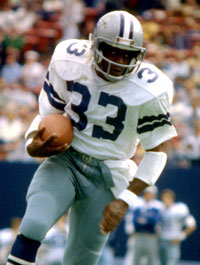
Tony Dorsett is a legend of Pittsburgh and is widely regarded as one of the greatest college footballers of all time. Dorsett was the first freshman in 29 years to be named an All-American, with Doc Blanchard of Army being the last player to do so. The Rochester, Pennsylvania-born player certainly made a big impression on Pittsburgh in a short amount of time and would go on to earn legendary status at Pitt.
Despite making it as an All-American in his freshman year, Dorsett would also become a father the same year. As a result of the birth of his first child, the running back would receive considerable criticism from those who believed that he should drop out of college to support his son’s mother. Dorsett disagreed, and believed that a career in football would give his family the best start. It appeared that Dorsett made the right decision.
Dorsett was inducted into the College Football Hall of Fame in 1994 as a result of his exploits at Pitt. His achievements included winning the 1976 Heisman Trophy, the Maxwell Award, the Walter Camp Award, the Chic Harley Award. Dorsett would go on to be the first round draft choice for Dallas Cowboys in 1977, winning the Super Bowl in that same year. There is no doubt that Dorsett is one of the true legends of college football.
Notable Achievements (College and NFL):
- Super Bowl x1
- Pro Bowl x4
- First-team All-Pro x1
- Second-team All-Pro x1
- NFL Offensive Rookie of the Year
- NFL record 99-yard rushing play
- Dallas Cowboys Ring of Honor x1
- National champion x1
- Heisman Trophy x1
- Maxwell Award x1
- Walter Camp Award x1
- First-team All-American x1
- Pittsburgh Panthers No. 33 jersey retired
Dick Butkus (Illinois)
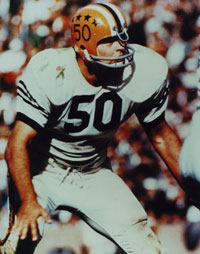
The greatest linebacker of all time? For many fans, observers, and pundits, Dick Butkus is the man who deserves that accolade. Butkus started out as a center for the Illini, making a transition that not many other players would be capable of. A standout player from a young age, the Chicago-born Butkus would go on to carve out a legendary career in college football before taking it to the NFL.
In the first year on the varsity team, Butkus earned a spot on the 1962 All-Big Ten Conference team by the Associated Press. He was also a second-team center, according to United Press International. The following year, Butkus helped Illinois to an 8-1-1 record, claiming the Rose Bowl over Washington in 1964. It was clear how important Butkus was to the team’s success, and this was recognized when he was named their most valuable player for that season.
A legendary co-captain of his team, Butkus stood out as a great leader on the field. He picked up his second most valuable player award in two seasons in 1964, before being chosen as a 1964 All-American by five of six selectors involved. On the field, there was no player who gave their heart and soul quite like the Chicago-born man, and this never escaped the attention of the college football admirers.
Butkus had ridiculous statistics that speak volumes for his efforts while wearing the Illinois colors. His reputation as a tenacious and dedicated team player is legendary at the college, where he is still heralded as an icon. In the NFL, Butkus was considered a fearsome tackler, who had no concerns other than taking out as many of the opposition as possible. A true legend, in all senses of the word.
Notable Achievements (College and NFL):
- Pro Bowl x8
- First-team All-Pro x6
- Second-team All-Pro x2
- NFL Defensive Player of the Year x2
- NFL 75th Anniversary All-Time Team
- NFL 1960s All-Decade Team
- NFL 1970s All-Decade Team
- Chicago Bears No. 51 jersey retired
- UPI Lineman of the Year
- Big Ten Most Valuable Player
- Consensus All-American x2
- Illinois Fighting Illini No. 50 jersey retired
Jim Brown (Syracuse)
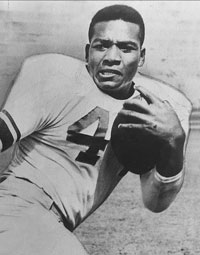
An unbelievable athlete, Jim Brown could have probably made his way into the Hall of Fames of many sports. To put things into perspective, Brown is already a member of the College Football Hall of Fame, the Pro Football Hall of Fame, and the Lacrosse Hall of Fame. Brown also played basketball and was a part of the track and field team over at Syracuse, which is nothing short of incredible to consider.
Brown is also one of the most respected figures in college football history. There are fewer players who carry as much reverence than Brown, even to this day. His achievements are still a source of pride for the good folk over at Syracuse, and why wouldn’t they be? Aside from being the second-leading rusher on his team, he rushed for 666 yards as a junior (an ominous number, it has to be said).
Despite the superstitious “666” Brown is seen as an angel at his former college. From Syracuse, the legendary fullback went on to enjoy a pro career that was also enriched with success. As an NFL fullback for the Cleveland Browns, Brown had 2,359 carries for 12,312 rushing yards and 106 touchdowns. These were all records at the time of his retirement.
Following his impressive exploits in college and pro football, Brown moved into the movie business as an actor. However, it is football where he made his name and found his fortunes. There are many who believe Jim Brown to be the greatest pro footballer of all time. While some might doubt this, we certainly don’t doubt that he is one of the greatest legends in college football history.
Notable Achievements (College and NFL):
- NFL champion
- Pro Bowl x9
- First-team All-Pro x8
- Second-team All-Pro
- AP NFL Most Valuable Player x3
- Bert Bell Award
- NFL Rookie of the Year
- NFL rushing yards leader x8
- NFL rushing touchdowns leader x5
- NFL 1960s All-Decade Team
- NFL 75th Anniversary All-Time Team
- Cleveland Browns No. 32 jersey retired
- Unanimous All-American
- Second-team All-American
- Syracuse Orange No. 44 jersey retired
Jim Thorpe (Carlisle)
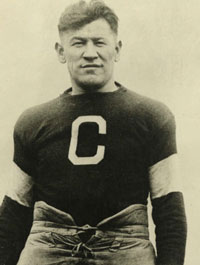
There are fewer players in the history of college football to have made the impact that Jim Thorpe did. To examine the great man’s talents is to also uncover the fact that he was exceptionally gifted in baseball and Olympic track running, lacrosse, and ballroom dancing. A born athlete, Thorpe was an Olympic gold medalist that also happened to be extremely gifted in football.
His talents in football saw him earn national praise when he scored every single point in Carlisle’s stunning 18-15 upset win over Harvard in 1911. The football community stood up and marveled at Thorpe’s incredible achievements, bringing him to the attention of everyone in the sport. In 1912, Carlisle won the national championship. There is little doubt that the achievement was majorly down to Thorpe’s influence.
His legend is still very much enshrined in football history. Unbeknown to many, Jim Thorpe had a vital role to play in the establishment of pro football. He was appointed the president of the NFL in the formative years of the league and would have a crucial role to play in the evolution of the sport. While many regard Jim Thorpe as the greatest Native American player of all time, he is simply one of the greatest players of all time.
The stats speak for themselves, at least. Die-hard football fans will undoubtedly rue their misfortune at not being around when Thorpe was playing. By all accounts, his stellar skills, speed, strength and pure athleticism were joys to behold. When it comes to players that embody what it means to be a legend of college football, you would have to look far and wide to find anyone who fits the bill quite like Jim Thorpe.
Notable Achievements (College and NFL):
- First-team All-Pro
- NFL 1920s All-Decade Team
- Consensus All-American x2
Tim Tebow (Florida)

Tim Tebow is a name that always pops up in the discussion for the greatest college footballers of all time. Like a surprising number of other men on this list, Tebow was also, well, just an incredible all-round athlete. As a college footballer, however, Tebow was an incredible player. It took the Florida man some time to establish himself and one the way, it is fair to say that he took a lot of criticism.
Despite what his detractors had to say about him, Tebow was certainly a talented and tenacious quarterback that took Florida to some dizzying heights. Becoming the first ever sophomore to win the Heisman trophy certainly helped to instill confidence in many at UF to invest time and patience into Tebow. Unfortunately, the mercurial standout could not get his hands on a second award.
Nonetheless, Tebow was instrumental in the Gators’ BCS title in 2006. He has the record of throwing just 15 interceptions in four years at Florida. Additionally, Tebow has a combined 145 touchdowns. Tebow was fond of wearing messages on his eye paint, which led to the NCAA enforcing what media called the “Tebow Rule,” that prohibited players from doing the same.
Tebow was seen as a player who could change the way football was played in the NFL, according to some. Despite concerns over his intangibles, Denver Broncos chose him in the first round of the draft. He would then be traded to the New York Jets, New England Patriots, and Philadelphia Eagles before embarking on a career as an outfielder for the New York Mets. Potential unfulfilled, or a maverick that could never settle?
Notable Achievements:
- BCS national champion x2
- SEC champion x2
- SEC Player of the Year x2
- Manning Award
- Maxwell Award x2
- Heisman Trophy
- Davey O’Brien Award
- AP Player of the Year
- Sporting News Player of the Year
- First-team All-American x2
- Second-team All-American
- First-team All-SEC x3
Earl Campbell (Texas)
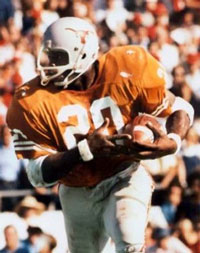
Earl Campbell’s legendary status in Texas is nothing to be scoffed at. An absolutely incredible specimen of strength and durability, there was never any doubt that the Tyler, Texas-native would become nothing but a roaring success in pro football. In college football, it seemed that his frame and maturity were years ahead of where his birth certificate should have determined where he should be.
Campbell was the first ever Longhorn to win the Heisman trophy. He was miles ahead of anyone else in the U.S. when it came to rushing in 1977, with 1,744 yards. Add 19 touchdowns to these incredible stats and you begin to understand just how incredible the college fullback was for Texas. When Campbell scored four touchdowns against Rice Owls that year, then the real attention started to come from scouts.
When the awards kept coming in and the press began to run out of superlatives, Campbell was given the respect he deserved. The Sporting News named Campbell as the college player of the year in 1977 and it wasn’t long before the United Press International followed suit. Every major selector named him as an All-American, on his way to finishing college with eyewatering statistics and records.
In 1978, Campbell was the first overall pick in the draft. He was signed to Houston Oilers on a lucrative contract. The investment by the Oilers was a wise one indeed, as Campbell would go on to establish himself as one of the greatest players in his era in the NFL. A born athlete and incredible footballer, Campbell is quite simply one of the greatest college footballers of all time.
Notable Achievements (College and NFL):
- Pro Bowl x5
- First-team All-Pro x3
- AP NFL Most Valuable Player
- NFL Offensive Player of the Year x3
- Bert Bell Award
- NFL Offensive Rookie of the Year
- NFL rushing yards leader x3
- NFL rushing touchdowns leader x2
- Tennessee Titans No. 34 jersey retired
- 1970s All-Decade Team (NFL)
- Heisman Trophy
- Davey O’Brien Memorial Trophy
- First-team All-American X2
- Texas Longhorns No. 20 jersey retired
Red Grange (Illinois)
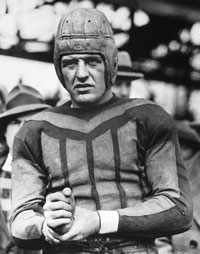
Red Grange is one of the most important figures in college football history. There is no doubt about that. The man known as the “Galloping Ghost” is a true legend of Illinois and one of only two players at the college (the other being Dick Butkus) to have their jersey’s retired. So what made Grange such an heroic figure and eternal legend for Illinois? In order to understand this, we must consider his impact for Illinois.
It wasn’t like Grange had a lot of time to make an impact at the college, considering he only spent two years there. As fate would have it, these two years would be enough to earn him a place into the record books. Starting off as he meant to continue, Grange would score three rushing touchdowns in his first game against Nebraska. Quite the impression and one that set the precedent for what was to come.
At one point in his collegiate career, Grange allegedly scored four touchdowns in just twelve minutes. That’s four touchdowns within a quarter, in modern terms. According to Illinois records, Grange ran for 723 yards and scored 12 touchdowns in just seven games. This was done as a sophomore. That season, Illinois would win the Helms Athletic Foundation national championship, going unbeaten in the process.
During a game against Michigan in Oct. 1924, Grange would gain attention across the U.S. for his performance. The Wolverines were the defending national champions, and the scene was set at the new Memorial Stadium that was built to honor both alumni and students who had done their bit to service America in World War I. With Michigan as overwhelming favorites, it appeared that Illinois had their work cut out.
Grange, however, had other ideas and returned the opening kickoff that resulted in a 95-yard touchdown. If that wasn’t enough, he scored another six touchdowns in total. Illinois had completely poleaxed the champions by 39 to 14, with Grange standing out as the star man on the day. To many college football historians, Grange is among the absolute greatest college footballers to have ever played the game.
Notable Achievements (College and NFL):
- NFL champion x2
- First-team All-Pro x2
- Second-team All-Pro
- NFL 1920s All-Decade Team
- Chicago Bears No.77 jersey retired
- National champion
- Big Ten Most Valuable Player
- Consensus All-American x3
- Illinois Fighting Illini No. 77 jersey retired
Barry Sanders (Oklahoma State)
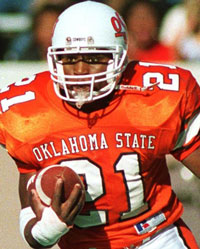
Depending on who you ask, Barry Sanders is the greatest college football player of all time. In 1988, the Oklahoma State running back made a mockery of the record books, recording what is possibly the greatest ever season, for a college football player, in history. When you consider some of the great players that would come before him – and their achievements – it is truly spectacular to view those stats.
Sanders would rush for 2,850 yards and score 42 touchdowns in just 12 games. This level of quality saw him gain nationwide acclaim and the coveted Heisman trophy in the process. There was little doubt that Sanders was the greatest college footballer in America that year, so there were no surprises when he was declared as a unanimous All-American. Incredible achievements, as you will most probably agree.
Sanders played just two seasons for Oklahoma State. In his first season, in 1987, Sanders’ stats of 31.6 saw him as the leader in yards per kickoff return. That year, he also scored 8 touchdowns and rushed more than 600 yards. Sanders took Thurman Thomas’ spot in the team when the former made his way to the NFL, becoming the starter in his position in his junior year.
Sanders was an incredibly hard grafter, too, averaging more than 200 yards per game. Additionally, he was Oklahoma’s punt and kickoff returner, which brought him another 516 yards on special teams. There is little doubt that Sanders has one of the most impressive resumes in college football history and this helped him secure a move to Detroit Lions prior to the start of his senior year.
In an eight-year career with the Lions, Sanders was a consistent performer and made the NFL team of the 1990s. Despite his efforts, he never made a Super Bowl and is regarded as one of the finest players in the history of the NFL never to do so. His college career is legendary, especially his efforts in 1988, and he is widely regarded as one of the greatest college players of all time. In 2003, Sanders made the College Football Hall of Fame.
Notable Achievements (College and NFL):
- Pro Bowl x10
- First-team All-Pro x6
- Second-team All-Pro x2
- NFL Most Valuable Player
- NFL Offensive Player of the Year x2
- Bert Bell Award x2
- NFL rushing yards leader x4
- NFL rushing touchdowns leader
- NFL Offensive Rookie of the Year
- NFL 1990s All-Decade Team
- Detroit Lions No. 20 jersey retired
- Heisman Trophy
- Maxwell Award
- Walter Camp Award
- Unanimous All-American
Archie Griffin (Ohio State)
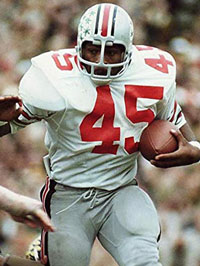
The first player to win the Heisman trophy twice? Well, that would Archie Griffin. The Ohio State legend was also the first man to ever start in four Rose Bowls. Two pretty incredible records for any player to have on their resume, but with Archie Griffin, that is just scratching the surface. The Columbus, Ohio-native enjoyed a pretty incredible NCAA football career.
The running back represented the Buckeyes between the years of 1972 and 1975. It didn’t take Griffin long to establish himself in the team, winning a starting position in his first year. While his success was immediate, his position was changed from T-formation halfback in 1972 to I-formation tailback from 1973 to 1975. He was Ohio State’s leader in rushing, with 867 yards in 1972, but things got better following his positional change.
In his sophomore year, Griffin rushed for 1,482 yards in the regular season. He became the only back to lead the Big Ten Conference in rushing for three consecutive years, which is no mean feat. In total, the Ohio State man made 5,589 yards on 924 carries between the years of 1972 and 1975 (a record at the time). Griffin also scored a total of 26 touchdowns during this period, which helped Ohio to a 40-5-1 record.
According to many college football historians, Archie Griffin is one of the greatest college players in the history of the game. He was the face of Ohio State while representing the college and one of the most respected players in the league at the time. There is no doubt that Griffin deserves his place in the pantheon of the NCAA’s greatest ever college football players and owns one of the finest resumes to back it up.
Although a first-round draft pick for the Cincinnati Bengals, Griffin could not translate his success in college football to the NFL. His pro football career was a little underwhelming, to say the least.
Notable Achievements (College and NFL):
- Maxwell Award
- Heisman Trophy
- Walter Camp Award
- Sporting News Player of the Year
- UPI Player of the Year x2
- Big Ten Most Valuable Player x2
- First-team All-American x3
- First-team All-Big Ten x3
- Ohio State Buckeyes No. 45 retired
Herschel Walker (Georgia)
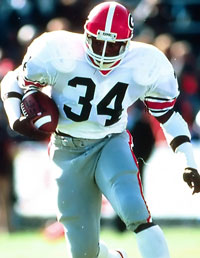
In various publications, on discussion boards, and among popular college-football related content, you will read of Herschel Walker’s greatness. To many, he is the greatest college football player in the history of the game. His stats do no justice to just how great Walker was at his time at Georgia, even if they are pretty impressive. Given his standing, there is no doubt that he deserves his place on this list.
After all, Walker had pretty much everything you would want in a player: speed, strength, vision, and was a model pro. To get an idea of just how impactful Walker was, as a freshman, he finished third in Heisman Trophy voting and set an NCAA record for the time in rushing yards (1,616) that would stand for 16 years. The following year, he finished second for the Heisman Trophy (making 1,891 rushing yards).
Walker would finally win the Heisman in 1982, becoming the first player in history to finish in the top three of votes in their first three seasons. His incredible performances for the Bulldogs have certainly not escaped the attention of many NCAA football historians, who widely label him as the greatest running back ever to feature in college football.
A three-time consensus All-American and SEC Player of the Year saw that he was not under appreciated in his time, either. In 33 regular season games, Walker would make 5,259 rushing yards and score 55 touchdowns. This incredible form led to Walker making his way to the NFL, with Minnesota Vikings famously trading five players and six draft picks to secure the Wrightsville, Georgia-native. Wow.
Notable Achievements (College and NFL):
- Pro Bowl x2
- Second-team All-Pro x2
- National champion
- Heisman Trophy
- Maxwell Award
- Walter Camp Award
- Sporting News Player of the Year
- UPI Player of the Year
- SEC Player of the Year x3
- Consensus All-American x3
- First-team All-SEC x3
- Georgia Bulldogs No. 34 jersey retired